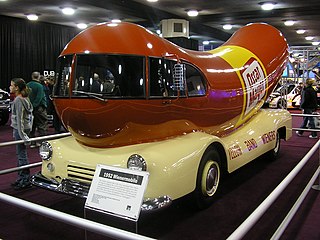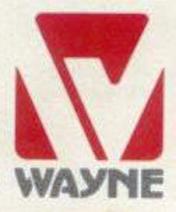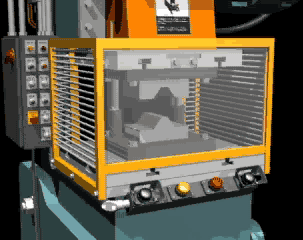History
The company started in 1860 as a carriage factory known as the Wehe Company in Marshallville, Ohio. In 1882 blacksmith George Gerstenslager went to work for the company, and by 1904 was the owner and eponym. In 1907, the company moved to Wooster, Ohio. In the early 1920s, Gerstenslager changed from production of buggies, surreys and wagons to van bodies and special truck bodies.

Marshallville is a village in Wayne County, Ohio, United States. The population was 756 at the 2010 census.

An eponym is a person, place, or thing after whom or after which something is named, or believed to be named. The adjectives derived from eponym include eponymous and eponymic. For example, Elizabeth I of England is the eponym of the Elizabethan era, and "the eponymous founder of the Ford Motor Company" refers to Henry Ford. Recent usage, especially in the recorded-music industry, also allows eponymous to mean "named after its central character or creator".

Wooster is a city in the U.S. state of Ohio and the county seat of Wayne County. The municipality is located in northeastern Ohio approximately 50 mi (80 km) SSW of Cleveland, 35 mi (56 km) SW of Akron and 30 mi (48 km) W of Canton. The population was 24,811 at the 2000 census and 26,119 at the 2010 Census. The city is the largest in Wayne County, and the center of the Wooster Micropolitan Statistical Area. Wooster has the main branch and administrative offices of the Wayne County Public Library.
After World War II, Gerstenslager began producing custom-built mobile units such as Bookmobiles, fire rescue vehicles, dental units, canteens, mobile X-ray units, mobile hospitals, as well as mobile television units used by the major networks. The company also built vehicles for the United States Postal Service. In the early 1950s, Gerstenslager designed five Wienermobiles for the Oscar Mayer hot dog producer. In the 1960s, the company expanded to make parts for the automotive, truck and agricultural industries.

World War II, also known as the Second World War, was a global war that lasted from 1939 to 1945. The vast majority of the world's countries—including all the great powers—eventually formed two opposing military alliances: the Allies and the Axis. A state of total war emerged, directly involving more than 100 million people from over 30 countries. The major participants threw their entire economic, industrial, and scientific capabilities behind the war effort, blurring the distinction between civilian and military resources. World War II was the deadliest conflict in human history, marked by 50 to 85 million fatalities, most of whom were civilians in the Soviet Union and China. It included massacres, the genocide of the Holocaust, strategic bombing, premeditated death from starvation and disease, and the only use of nuclear weapons in war.

The United States Postal Service is an independent agency of the executive branch of the United States federal government responsible for providing postal service in the United States, including its insular areas and associated states. It is one of the few government agencies explicitly authorized by the United States Constitution.

"Wienermobile" is a series of automobiles shaped like a hot dog on a bun which are used to promote and advertise Oscar Mayer products in the United States. The first version was created in 1936 by Oscar Mayer's nephew, Carl G. Mayer, and variants are still used by the Oscar Mayer company today. Drivers of the Wienermobiles are known as Hotdoggers and often hand out toy whistles shaped as replicas of the Wienermobile, known as Wienerwhistles.
After expanding their sheet metal stamping capabilities in support of the custom truck division, the stamping division continued to grow through partnerships with most major automotive manufacturers to make aftermarket parts. In later years the stamping division became the larger part of the company and the custom truck division was shut down in 1986 so the company could focus all resources to the stamping division.
In 1997, Gerstenslager was acquired by Worthington Industries of Columbus, Ohio.

Columbus is the state capital of and the most populous city in the U.S. state of Ohio. With a population of 879,170 as of 2017 estimates, it is the 14th-most populous city in the United States and one of the fastest growing large cities in the nation. This makes Columbus the third-most populous state capital in the US and the second-most populous city in the Midwest. It is the core city of the Columbus, OH Metropolitan Statistical Area, which encompasses ten counties. With a population of 2,078,725, it is Ohio's second-largest metropolitan area.

Studebaker was an American automobile manufacturer based in South Bend, Indiana. Founded in 1852 and incorporated in 1868 as the Studebaker Brothers Manufacturing Company, the firm was originally a producer of wagons for farmers, miners, and the military.

PACCAR Inc is an American Fortune 500 company and counts among the largest manufacturers of medium- and heavy-duty commercial vehicles in the world. PACCAR is engaged in the design, manufacture and customer support of light-, medium- and heavy-duty trucks under the Kenworth, Peterbilt, Leyland Trucks and DAF nameplates. PACCAR also designs and manufactures diesel engines, provides financial services and information technology, and distributes truck parts related to its principal business.

Checker Motors Corporation was a Kalamazoo, Michigan-based vehicle manufacturer and tier-one subcontractor that manufactured taxicabs used by Checker Taxi. Checker Motors Corporation was established by Morris Markin in 1922 through a merger of Commonwealth Motors and Markin Automobile Body.

Wayne Corporation was a manufacturer of buses and other vehicles branded with the trade name "Wayne." The corporate headquarters were in Richmond, Indiana, in Wayne County, Indiana, in the United States. During the middle 20th century, Wayne served as a leading producer of school buses in North America.
A knock-down kit is a kit containing the parts needed to assemble a product. The parts are typically manufactured in one country or region, then exported to another country or region for final assembly. Variant names include knockdown kit, knocked-down kit, or simply knockdown, and the abbreviated KD.
Superior Coach is a former body manufacturer of the American automotive industry. Founded in 1909 as the Garford Motor Truck Company, Superior is best known for constructing bodies for professional cars (hearses) and yellow school buses. Following major downturns in both segments in the late 1970s, Superior was liquidated by its parent company in 1980. From 1925 to 1980, the company was based in Lima, Ohio.

FAW Group Corporation is a Chinese state-owned automotive manufacturing company headquartered in Changchun, Jilin, China. Its principal products are automobiles; buses; light, medium, and heavy-duty trucks; and auto parts. FAW became China's first automobile manufacturer when it unveiled the nation's first domestically produced passenger car, the Hong Qi, in 1958.

Spartan Motors, Inc. is an American automobile design company that designs, engineers and manufactures specialty chassis, specialty vehicles, truck bodies and aftermarket parts for the recreational vehicle (RV), emergency response, government services, defense, and delivery and service markets. The company is based in Charlotte, Michigan, and employs approximately 2,300 workers at facilities in Michigan, Pennsylvania, Nebraska, South Dakota, Indiana, Wisconsin, Missouri, and Mexico. Spartan reported sales of $707 million in 2017. It was started in 1975 by George Sztykiel and a group of individuals whose employer, Diamond Reo, went bankrupt.

Stamping is the process of placing flat sheet metal in either blank or coil form into a stamping press where a tool and die surface forms the metal into a net shape. Stamping includes a variety of sheet-metal forming manufacturing processes, such as punching using a machine press or stamping press, blanking, embossing, bending, flanging, and coining. This could be a single stage operation where every stroke of the press produces the desired form on the sheet metal part, or could occur through a series of stages. The process is usually carried out on sheet metal, but can also be used on other materials, such as polystyrene. Progressive dies are commonly fed from a coil of steel, coil reel for unwinding of coil to a straightener to level the coil and then into a feeder which advances the material into the press and die at a predetermined feed length. Depending on part complexity, the number of stations in the die can be determined.
Mauck Specialty Vehicles was created by Andy Mauck. It was a builder of custom bus-like vehicles headquartered in Worthington, Ohio, United States, near the headquarters of Worthington Industries, run by John McConnell, who provided the early financing to get the MSV off the ground. Mauck had previously sold custom firetrucks for a company called Sutphens.

Sheller-Globe Corporation was a U.S. auto parts manufacturer and industrial conglomerate based in Toledo, Ohio. Formed in 1966 on a heritage of much older companies, Sheller-Globe grew through the acquisition of many other businesses before it was acquired by United Technologies Corporation in 1989.
AETHRA is a Brazilian company, founded in 1974 in Minas Gerais, that applies technology to develop and manufacture automotive systems to the global market.

Stewart & Stevenson is an American privately held company, based in Houston, Texas. The company designs and manufactures specialized equipment and aftermarket parts and service for the oil and gas and other industries.

Multi-stop trucks are a type of light-duty and medium-duty truck created for local deliveries to residences and businesses. They are designed to be driven either sitting down or standing up, and often provide easy access between the driver and goods, hence the name "Walk-In Delivery" van. They are taller than full-size vans such as the Ford Econoline, Dodge A-Series/B-Series/Ram Vans, and Chevrolet G-Series vans, but can have wheelbases that are shorter than these models or longer.

TVS Supply Chain Solutions is a firm that supplies spare parts and components to customers in the automotive, defence and utility sectors in the United Kingdom, Europe and the US.

The automotive industry in the United States began in the 1890s and, as a result of the size of the domestic market and the use of mass production, rapidly evolved into the largest in the world. However, the United States was overtaken as the largest automobile producer by Japan in the 1980s, and subsequently by China in 2008. The U.S. is currently second among the largest manufacturer in the world by volume, with approximately 8-10 million manufactured annually. Notable exceptions were 5.7 million automobiles manufactured in 2009, and peak production levels of 13-15 million units during the 1970s and early 2000s.
This article provides an overview of the automotive industry in countries around the world.
Serbia's automotive industry is one of the most important industrial sectors and makes about 15% of industrial output of the country and 18% of all exports.

The automotive industry in Sweden is mainly associated with passenger car manufacturers Volvo Cars and Saab Automobile but Sweden is also home of two of the largest truck manufacturers in the world: Volvo AB and Scania AB. The automotive industry is heavily dependent on export as some 85 percent of the passenger cars and 95 percent of the heavy vehicles are sold outside of Sweden. The automotive industry and its sub-contractors is a major part of Swedish industry. In 2011 around 110,000 people were employed and the export income of 150 billion SEK accounted for 12 per cent of Sweden’s export income. During 2009 128,738 passenger cars and 27,698 heavy vehicles were built in Sweden.





















